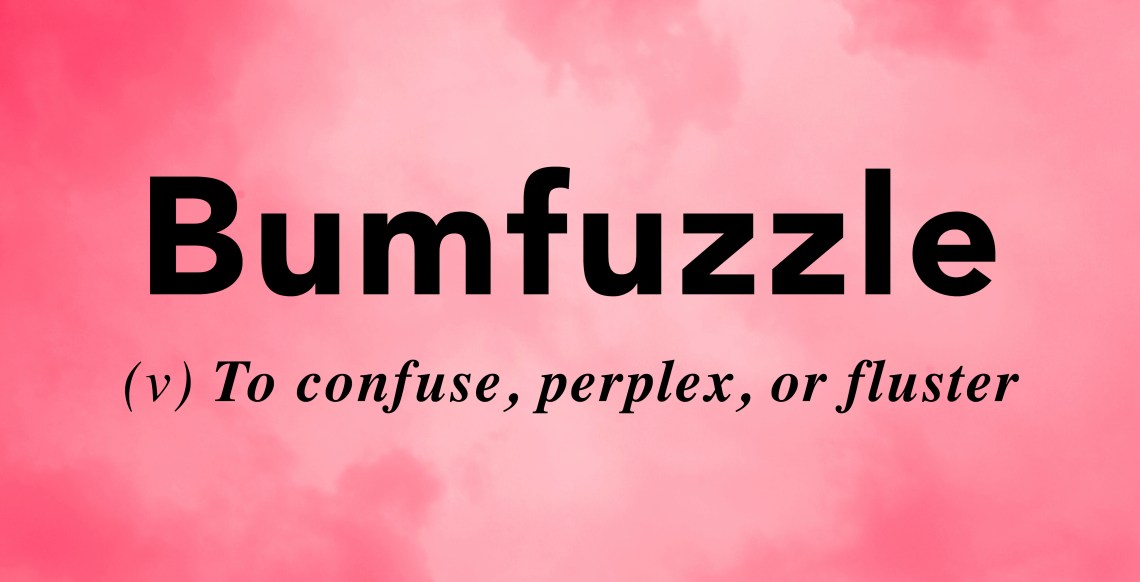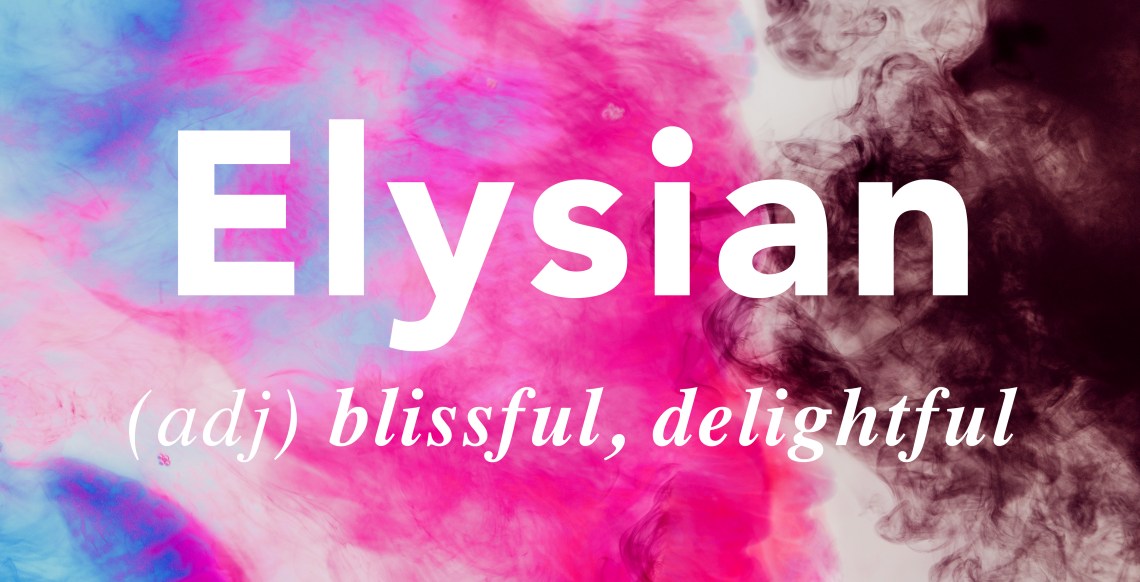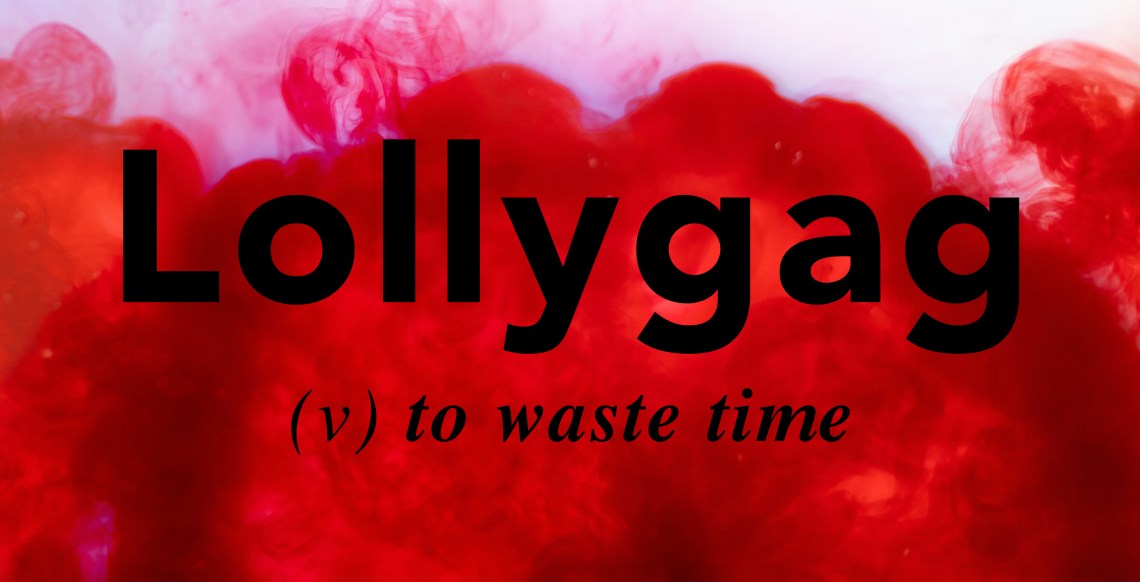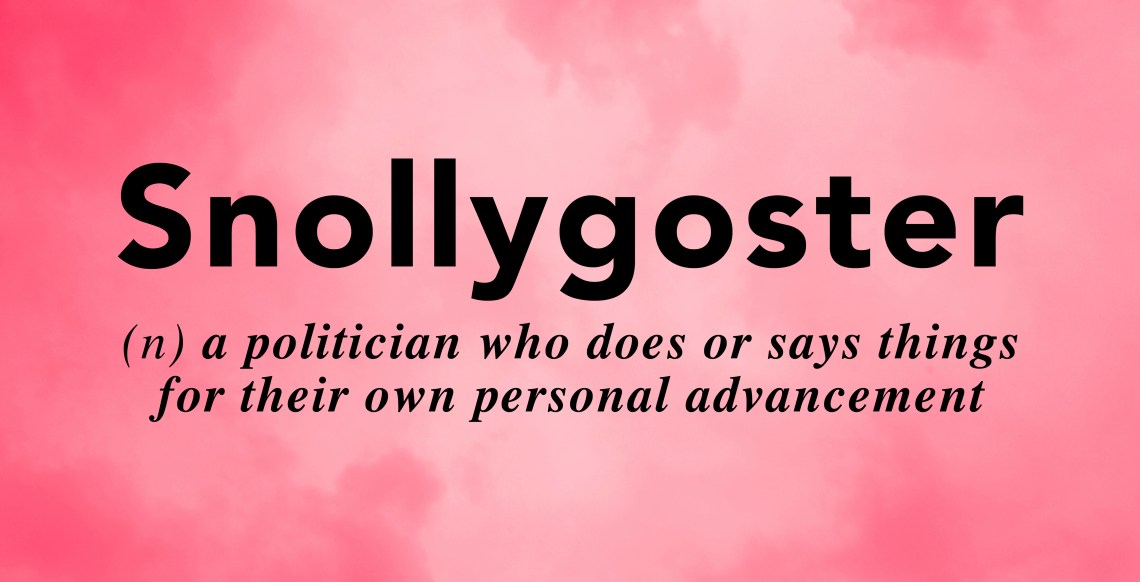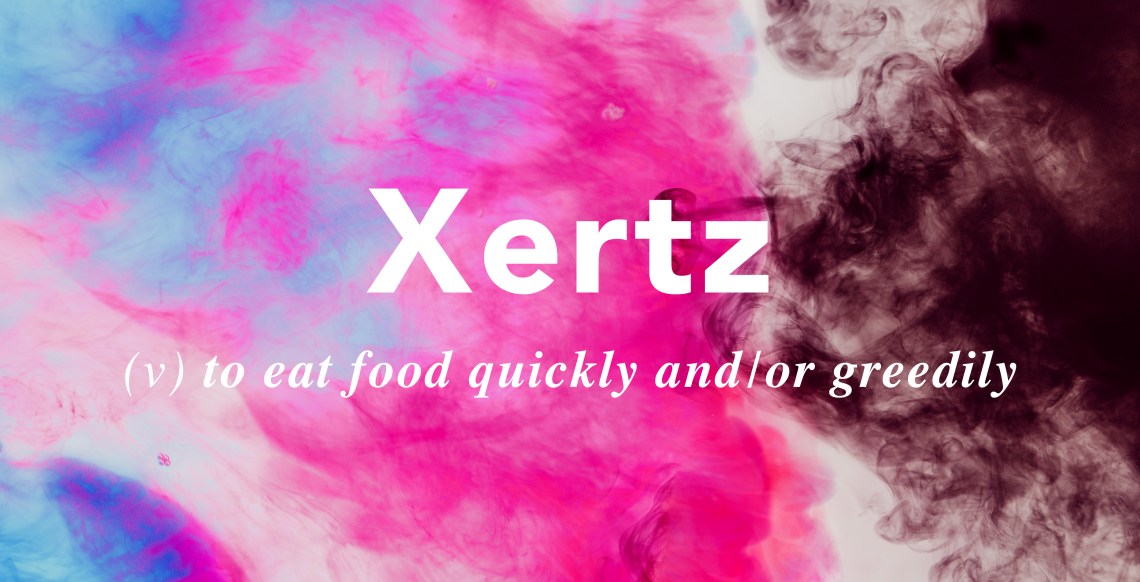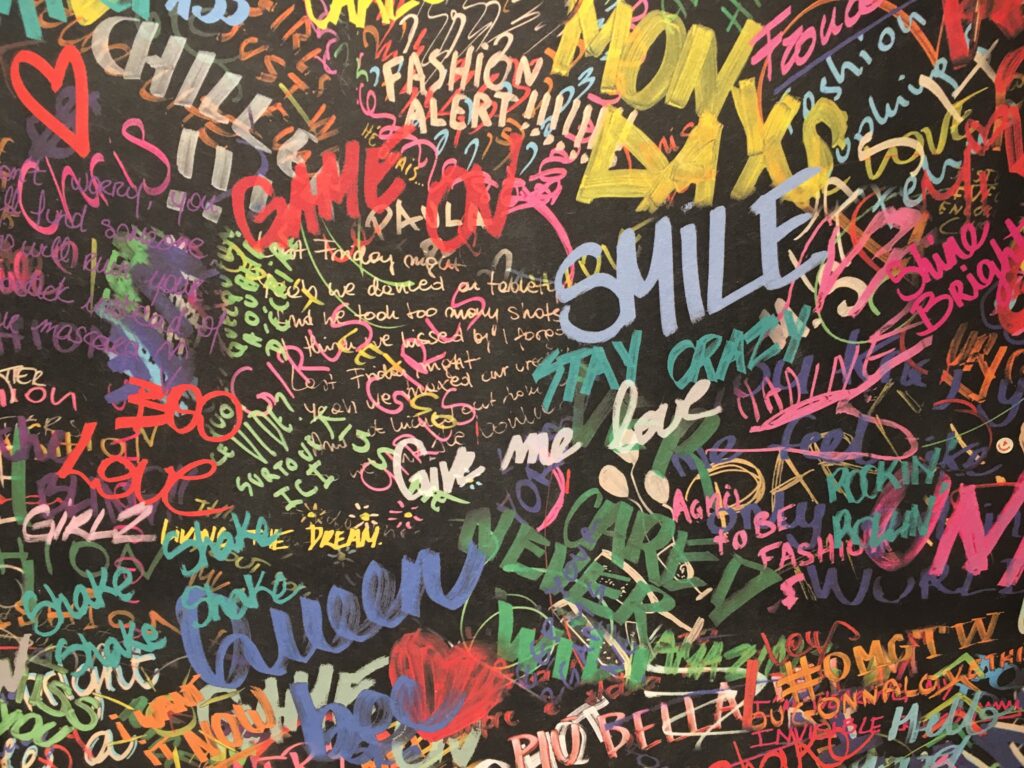These interesting words will help you sound smarter in any conversation.
You send dozens of texts and spend hours talking every single day — but you are reusing most of your words. You are repeating yourself without even realizing you are doing so. There are hundreds of interesting words that you have never even heard of before (or you might have already heard but have no idea how to use them in a sentence).
It’s time to learn something new, to broaden your vocabulary, to sound even more eloquent than you already are. If you can find a way to slip these words into everyday conversation, you are going to look like the most intelligent person in the room.
Aa — a kind of volcanic lava that forms jagged masses with a light frothy texture
Abibliophobia — afraid of running out of things to read
Aquiver — trembling
Aurora — dawn
Aplomb — self-confident
Acnestis — between the shoulder blades and the loins which an animal cannot reach to scratch
Apropos — appropriate
Atrate — dressed in black
Agelast — a person who never laughs
Agastopia — admiration of a particular part of someone else’s body
Bibliopole — a person who buys and sells books, especially rare ones
Biblioklept — a person who steals books
Bibble — eating or drinking noisily
Bloviate — people who talk for a long period of time
Balter — dance clumsily
Bedizen — dress gaudily
Bleb — a blister
Boondoggle — a waste of time and money
Burke — murder without leaving a trace on the body
Borborygm — hungry
Bombinate — making a humming or buzzing noise
Bumbershoot — an umbrella
Cattywampus — in disarray
Collywobbles — a weird feeling in your stomach
Cahoots — secret partnership
Caruncle — the triangular, pink areas at the corner of your eyes
Churlish — rude
Compotation — a drinking party
Conspuer — to spit with contempt
Comeuppance — getting what you deserve
Cancatervate — heaping things into a pile
Cabotage — the exclusive right of a country to control the air traffic within its borders
Cromulent — appearing legitimate but actually being spurious
Donnybrook — an uprising, a melee, or a riot
Darkle — becoming cloudy or dark
Defenestration — the act of throwing someone out of a window
Denouement — the resolution of a narrative
Doodle sack — bag pipes
Duffifie — laying a bottle on its side for some time so that it may be completely drained of the few drops remaining
Draconian — unusually severe
Erinaceous — resembling a hedgehog
Ethereal — Extremely delicate, light, not of this world
Egress — an exit
Ennui — bordem
Erratum — an error in printing
Epistemology — the study of knowledge
Esoteric — knowledge that is only available to a select group of people
Epoch — A particular period of time in history or a person’s life
Eurhythmic — an aesthetically pleasing rhythm or structure
Flibbertigibbet — silly and overly talkative
Foppish — foolish, silly, obsolete
Fugacious — fleeting or transient
Fillip — snapping your fingers
Gubbins — an object that has little or no value
Grawlix — a series of symbols commonly used in comics or cartoons to represent curse words
Grommet — an eyelet of firm material to strengthen or protect an opening or to insulate or protect something passed through it
Hubris — excessive presumption, exaggerated pride or self-confidence
Halfpace — a platform of a staircase where the stair turns back in exactly the reverse direction of the lower flight
Hiraeth — A homesickness for a home you can’t return to, or that never was
Impignorate — pawning something
Interrobang — a punctuation mark designed for use especially at the end of an exclamatory rhetorical question; usually written as ?!
Interfenestration — the space between two windows
Ineffable — Too great to be expressed in words
Jentacular — pertaining to breakfast
Jalopy — an old, decrepit, or unpretentious automobile
Kyphorrhinos — a nose with a bump in it
Lamprophony — loudness and clarity of enunciation
Limerence — being infatuated with another person
Logophile — lover of words
Lothario — a man whose chief interest is seducing women
Malarkey — insincere, foolish talk
Macrosmatic — having a good sense of smell
Meldrop — a drop of mucus at the nose, whether produced by cold or otherwise
Metanoia — a spiritual transformation
Meme — an idea, behavior, style, or usage that spreads from person to person within a culture
Nincompoop — an idiot
Nibling — the gender-neutral term for nieces or nephews
Nefarious — Wicked, villainous, despicable
Numinous — spiritual, supernatural
Nudiustertian — the day before yesterday
Oblivion — the state of being unaware of what is happening around you
Octothorpe — the hashtag symbol
Obelus — the division symbol
Oxter — armpit
Pandiculation — yawning and stretching
Pauciloquent — someone who doesn’t say much
Pilgarlic — a bald head
Phosphenes — the light and colors produced by rubbing your eyes
Petrichor — The pleasant, earthy smell after rain
Preantepenultimate — fourth from last
Paresthesia — the prickly feeling when your limb “falls asleep.”
Poobah — a powerful person.
Pogonotrophy — growing and grooming a beard or other facial hair
Rasher — a thin slice of bacon
Taradiddle — filled with pretentious nonsense
Tergiversate — to change repeatedly one’s attitude or opinions with respect to a caus
Snickersnee — a long, dangerous knife
Salopettes — high-waisted skiing pants with shoulder straps
Supine — Lying face upwards
Sonder — the realization that each passerby has a life as vivid and complex as your own
Schadenfreude — experiencing pleasure or satisfaction from the trouble, failure or humiliation of others
Somnambulist — A person who sleepwalks
Serendipity — The chance occurrence of events in a beneficial way
Snellen chart — the standard eye exam chart.
Scintillate — emitting sparks
Syzygy — an alignment of celestial bodies
Tittynope — a small quantity of something left over
Ulotrichous — having wooly or crispy hair
Quire — two dozen sheets of paper
Quixotic — unrealistically optimistic
Valetudinarian — a sickly or weak person, especially one who is constantly and morbidly concerned with his or her health
Vellichor — the strange wistfulness of used bookshops
Wabbit — exhausted
Widdershins — moving counter-clockwise
Winklepicker — a shoe with a long pointed toe
Yarborough — when the dealer deals a hand without any numbers above nine
Zoanthropy — a person who has delusions that they are a form of animal
There’s a classic old comedy routine, or maybe it was originally an essay, about the word “fuck.” It’s been around as long as we can remember, but no one seems to know who first wrote or performed it. We’ve seen it attributed to George Carlin, Monty Python and the announcer most famous for being “the voice of Disneyland,” Jack Wagner. Yet the origins of this brilliant bit of prose remains one of the great comedic mysteries of our time. Apparently, nobody knows who the fuck wrote it.
For those of you who are unfamiliar with this historic and hilarious piece of literature, and for those of you who haven’t heard it in a long time, here it is in its most comprehensive and expanded form that we could find:
Perhaps one of the most interesting words in the English language today is the word fuck. Out of all of the English words that begin with letter F, fuck is the only word that is referred to as the F-word. It’s the one magical word, just by its sound can describe pain, pleasure, hate and love. Fuck, as the most words in the English languages, is derived from German, the word fricken which means to strike. In English fuck fall into many grammatical categories.
It can be used as a verb, both transitive (John fucks Mary) and intransitive (Mary was fucked by John, as a noun (Mary is a fine fuck) and as an adverb (Mary is fucking well interested in John).
It can be used as a verb, both transitive (John fucks Mary) and intransitive (Mary was fucked by John, as a noun (Mary is a fine fuck) and as an adverb (Mary is fucking well interested in John).
It’s meaning is not always sexual.
It can be an adjective such as “John’s doing all the fucking work.”
As part of an adverb: “Mary talks too fucking much!”
As an adverb, enchancing an adjective: “Mary is fucking beautiful!”
As part of a word: “Abso-fucking-lutely” or “in-fucking-credible.”
And, as almost every word in a sentence: “Fuck the fucking fuckers!”
As you must realize there aren’t too many words with the versatility of fuck.
As in these examples describing emotions and situations such as:
Aggression – Fuck you!
Agreement – Fucking-ay right!
Amazement – Fucking shit!
Annoyance – Don’t fuck with me.
Apathy – Who gives a fuck?
Benevolence – Don’t do me any fucking favors.
Command – Go fuck yourself!
Confusion – What the fuck?
Denial – I didn’t fucking do it.
Despair – Fucked again.
Difficulty – I don’t understand the fucking question.
Directions – Fuck off.
Disbelief – Unfuckingbelievable!
Dismay – Oh, fuck it!
Displeasure – What the fuck is going on here?
Encouragement – Keep on fucking.
Enjoyment – This is pretty fucking good!
Etiquette – Pass the fucking salt!
Fraud – I got fucked.
Greetings – How the fuck are you?
Hatred of chemistry – Thermofuckingdynamics.
Hostility – I’m going to bash your fucking face in!
Identification – Who the fuck are you?
Ignorance – How the fuck do I know?
Incompetence – He’s a fuck up.
Insight – You’re out of your fucking mind!
Laziness – He’s a fuck off.
Lost – Where the fuck are we?
Passive – Fuck me!
Perplexity – I don’t fucking know.
Philosophical – Who gives a fuck?
Pleasure – I couldn’t be any fucking happier!
Question – Are you fucking with me?
Rebellion – Fuck the world!
Request – Get the fuck out of here!
Resignation – Oh, fuck it!
Retaliation – Up your fucking ass!
Surprise: Fuck! You scared the shit out of me.
Suspicion – What the fuck are you doing?
Trouble – I’m really fucked now.
Ugliness – You’re a dumb looking fuck.
Wisdom – Fuck that shit!
Wonder – How the fuck did you do that?
It can be used in an anatomical description – He’s a fucking asshole.
It can be used in business – How did I wind up with this fucking job?
It can be maternal – Motherfucker.
It can be political – Fucking politicians.
It has also been used by many notable people
throughout history:
“What the fuck was that?” – Mayor of Hiroshima
“Where did all these fucking Indians come from?” – General Custer
“Where the fuck is all this water coming from?” – Captain of the Titanic
“That’s not a real fucking gun.” – John Lennon
“Who’s gonna fucking find out?” – Richard Nixon
“Heads are going to fucking roll.” – Anne Boleyn
“Let the fucking woman drive.” – Commander of the Challenger
“What fucking map?” – Mark Thatcher
“Any fucking idiot could understand that.” – Albert Einstein
“It does so fucking look like her!” – Picasso
“How the fuck did you work that out?” – Pythagoras
“You want what on the fucking ceiling?” – Michaelangelo
“Fuck a duck.” – Walt Disney
“Why?- Because it’s fucking there!” – Edmund Hilary
“I don’t suppose it’s gonna fucking rain?” – Joan of Arc
“Scattered fucking showers my ass.” – Noah
“I need this parade like I need a fucking hole in my head.” – John F. Kennedy
I’m sure you can think of many more examples. With all of these multipurpose applications how can anyone be offended when you use the word? So, use this unique and flexible word more often in your daily speech. It will identify the quality of your character immediately. Say it loudly and proudly: “FUCK YOU !!!”
While many of us love saying the word, perhaps nobody says it better than Susie Essman on Curb Your Enthusiasm. If you don’t believe us, check out her Greatest Fucking Hits.
As we have seen in the previous blog, How knowing other languages can help you learn English, there are many words in the English language ??which come from other countries. Some of these words do not only come from another language and you may not know it, but they also have an origin which you probably couldn’t have imagined. 10 interesting English words
In today’s blog we’re going to take a look at 10 interesting English words whose origin will surprise you. We even actually use some of these words in our daily life when speaking or writing, and they really have strange and unique origins that are unknown to us. You might even find funny the origins of some of these words!
1. Sandwich
The word sandwich ? makes reference to a very popular kind of food, made out of two slices of bread and some other food we put in the middle of it (such as cheese, ham, turkey, etc.).
What we don’t know is that this food was named after the 4th Earl of Sandwich, an English nobleman from the 1800s. It is believed that he used to eat his food between two pieces of bread so he could keep on playing on his gambling table, and his friends started asking the servants for “the same as Sandwich” and finally just “a sandwich”.
2. Clue
The word clue ? comes from the Greek word ‘clew’, used in the Greek myth of Theseus and the Minotaur. In this myth, Theseus used a ball of yarn or a ‘clew’ given to him by Ariadne so that he could find his way out of the labyrinth and not get lost.
A ‘clew’ is something that you use to guide your path, and it ended up becoming something that offers you guidance in your search to discover a truth. The spelling also changed a bit over time, becoming the word we use nowadays: ‘clue’.
3. Hooligan
Hooligan ? is a word used to describe a person who likes causing trouble for other people. The origin of the word is not completely clear, as there are many theories about it. If you look for the meaning in the Oxford English Etymology Dictionary, the name comes from an Irish surname (Houlihan) mentioned in an old song in the 19th Century.
The other most popular theory is that its origin goes back to the Jacobite Rising in the 18th Century, when a commander from the English army misheard the word for the insect midge in Scottish Gaelic, and created the word ‘hooligan’ to describe anyone and anything which was as frustrating as a midge.
4. Nice
The word nice ? is commonly used by students learning English, which has a positive meaning and is used to describe a good or pleasant person. But the word actually has a negative origin, as it is said to come from the French ‘nice’ which comes from the Latin ‘necius’.
At first it was used to describe a person who over-dressed in an absurd way but it finally (somehow) came to have the positive meaning that it has nowadays.
5. Shampoo
The word shampoo ?, which we normally use to refer to that soap we use to clean our hair, comes from the Hindi language and it means ‘to massage’. It was introduced into the English language and it ended up changing its meaning to something we use to ‘wash the hair’.
6. Nightmare
The word nightmare ? comes from joining two different words which are ‘night’ and ‘mare’. We know that the meaning of night is the period between sunset and sunrise, when we usually go to sleep. But the word mare (which shouldn’t be confused with mare = yegua) refers to a female goblin ? which suffocates you and tries to introduce bad thoughts into your head while you sleep.
7. Tattoo
Tattoos ✒️ are a really popular thing that many people get done nowadays, but few people know that the word comes from the Polynesian ‘tatau’ which means ‘a mark made on the skin’, which is the same as the meaning we have for the English word.
Before introducing this word into the English language, tattoos in England (which were done before the Polynesia was discovered) were referred as a form of painting, and they weren’t seen as badly as they are nowadays by older people.
8. Ketchup
Ketchup ?, which is one of the most popular sauces in the entire world, was first used in the 17th Century and comes from the Chinese word ‘kôe-chiap’ which used to refer to a mix of pickled fish and spices. In the English language it was first used at the end of the 17th Century and it was spelt ‘catchup’.
9. Checkmate
Checkmate ♟️, which is used in English to refer to a chess move in which the figure of the king doesn’t have any moves left to escape and is completely trapped, comes from the Persian word ‘shāh māt’ (which translates to ‘the king is helpless’). It can also be traced to the Arabic language, in which the word ‘māta’ means dead (the king is dead). 10 English words
10. Robot
Robot ? normally refers to a machine which is capable of carrying out many different actions in an autonomous way. But the word robot comes from the Czech word ‘robota’ which actually means ‘forced labour’.
It is funny, as robots are ‘forced’ to do things for us and they cannot choose to not do it, so we could say they are forced to work for us.
Now I would like to know which of these words’ origins did you find most interesting. Did you already know any of their origins? Do you know any other words in the English language which have a strange or funny origin? Let us know in the comments section below!
Estefanía
By
Last updated:
February 1, 2023
Have you ever heard someone say an English word you didn’t understand?
A lot of English words come from other cultures and languages, so English has a ton of interesting words that you may not be familiar with yet.
The words in this post are considered unique because they have unusual spelling, pronunciation and meanings.
For each word, there is a pronunciation guide from Merriam-Webster, as well as our own audio, plus a definition and an example sentence.
So, let’s look at 16 unique words in English that you can add to your vocabulary lists!
Contents
- 1. Flummox
- 2. Dowdy
- 3. Howdy
- 4. Nincompoop
- 5. Muesli
- 6. Phlegm
- 7. Baloney
- 8. Myopic
- 9. Bamboozle
- 10. Phyllo
- 11. Thwart
- 12. Brouhaha
- 13. Zeal
- 14. Pneumatic
- 15. Noxious
- 16. Flimflam
- Why Learn Unique Words in English?
Download:
This blog post is available as a convenient and portable PDF that you
can take anywhere.
Click here to get a copy. (Download)
1. Flummox
Pronunciation: ˈflə-məks
When you read this word, does it jump out and make you a little confused?
If so, you were right to be confused and puzzled! That’s exactly what flummox (verb) means.
Whenever you see an unusual English word, you’re likely to be flummoxed for a bit until you check your dictionary and find out that its meaning is really quite simple.
2. Dowdy
Pronunciation: ˈdau̇-dē
This word looks simple but it’s unique in that it’s a pretty old word that’s not used often these days.
Dowdy (adjective) is used to describe something that’s old and shabby, not modern or stylish.
Maybe she’s having a bad day. I’ve never seen her wearing anything so dowdy before.
3. Howdy
Pronunciation: ˈhau̇-dē
This word rhymes with the previous word but means something completely different.
Howdy is a casual greeting that is not commonly used, but can add some flavor to your English.
4. Nincompoop
Pronunciation: ˈnin-kəm-ˌpüp
Here’s a word that not only looks funny but sounds funny too. Try saying it out loud!
What’s even funnier is that nincompoop (noun) means a silly person and is sometimes used jokingly to refer to someone who is not very smart.
My house is just down the road from the bus stop. I don’t understand how those nincompoops managed to lose their way.
5. Muesli
Pronunciation: ˈmyüs-lē
Notice the unusual spelling and pronunciation of this word, which was first used in 1939.
Muesli (noun) is a cereal consisting of rolled oats, fruits and nuts. It’s a popular breakfast food in Switzerland.
Eating a bowl of muesli in the morning is a healthy way to start your day.
6. Phlegm
Pronunciation: ˈflem
This word is unusual in that its spelling doesn’t reflect how it’s pronounced.
Phlegm (noun) is the viscous (thick) fluid that blocks your nose and throat when you have the flu.
Phlegm and a runny nose can really make you feel uncomfortable, so it’s best to take the day off and stay home till you feel better.
7. Baloney
Pronunciation: bə-ˈlō-nē
According to Merriam-Webster, this word was first used almost 100 years ago! Do you know what it means? Hint: It has nothing to do with balloons.
Baloney (noun) simply means nonsense and is often used when you disagree with someone.
That’s baloney! Don’t believe a word that he says!
8. Myopic
Pronunciation: mī-ˈō-pik
You may find this word unique because of its unusual spelling.
Myopic (adjective) is the scientific word for nearsightedness, an eye condition in which you’re unable to see objects or images that are far away from you.
I’m myopic. I really need my eyeglasses. I can’t see without them.
9. Bamboozle
Pronunciation: bam-ˈbü-zəl
This word was first used around 300 years ago. That’s really old! Any idea what it means? Hint: It’s not related to bamboo.
To bamboozle (verb) someone means to trick or confuse them.
I went to buy a TV that was on sale but ended up being bamboozled into buying a more expensive unit.
10. Phyllo
Pronunciation: ˈfē-(ˌ)lō
Now, this is a pretty unique word not only because of the way it’s spelled but also because of how it’s pronounced.
Phyllo (noun) is a very thin dough that pastry chefs layer together to form a flaky pastry.
The orange-pecan baklava pie I had yesterday was made with phyllo pastry. Yummy!
11. Thwart
Pronunciation: ˈthwȯrt
This word dates back to the 13th century. Indeed, its spelling is similar to how some old English words are spelled, and it’s unique because it’s still used quite often today.
To thwart (verb) means to ruin (spoil) someone’s efforts or to prevent a plan from becoming successful.
We spent months preparing to climb Mount Everest. Who knew the weather would thwart our plans at the last minute?
12. Brouhaha
Pronunciation: ˈbrü-ˌhä-ˌhä
Here’s an old-fashioned, informal word with a funny pronunciation that was taken directly from French. Are you laughing now? I bet you are. Ha-ha!
Brouhaha (noun) simply means an uproar (upset) or a lot of anger and complaining.
What’s with all that brouhaha? I think he did the right thing by resigning from his position.
13. Zeal
Pronunciation: ˈzēl
Words that begin with the letter “z” are always interesting. This one is also unique because it comes from Latin and Greek and was first used in the 14th century.
Zeal (noun) refers to a strong interest or eagerness in pursuing something.
Her zeal for handmade designer shoes and handbags has made her the talk of the town.
14. Pneumatic
Pronunciation: nu̇-ˈma-tik
Does this word look unusual to you? I find the spelling very interesting. It’s not common for the letter “p” to be followed by “n.”
Pneumatic (adjective) is used to describe something that’s filled with air or gas or that uses air pressure.
Can you think of an example of something that’s pneumatic? That’s right. Car tires, bicycle pumps and vacuum cleaners are all pneumatic.
15. Noxious
Pronunciation: ˈnäk-shəs
Words with the letter “x” are also quite interesting. Note the pronunciation of this word, as it’s not usually how you would pronounce the letter “x.”
Noxious (adjective) often refers to something that’s dangerous, harmful or destructive to living things.
You shouldn’t be standing behind that bus and breathing in all those noxious fumes. It’s bad for your health.
16. Flimflam
Pronunciation: ˈflim-ˌflam
Now here’s a cute and funny word that’s been around since the 16th century, according to Merriam-Webster. Can you guess its meaning?
Flimflam (noun) refers to a trick or a ploy to deceive someone.
If you’re going to buy a used car online, you must be able to separate the flimflam from the facts.
Why Learn Unique Words in English?
Because unique and unusual words are so interesting, they can be both good fun and challenging to learn.
When you look at a unique English word, you may be puzzled about how to pronounce it, or you may wonder why it’s spelled the way it is.
Apart from satisfying curiosity and challenging yourself, it’s easy to see why knowing unique words can be useful if you’re someone who loves playing word games. Many of these words may not be used very often, which may put you at an advantage to win!
Finally, because unusual English words are used less often, using them will make you sound smart.
Remember, the more you practice with these unique English words the more fluent you’ll sound, and you’ll surely impress a lot of people! Learning unique words is one path to becoming an advanced English learner.
So there you have it—a list of unique English words you can add to your vocabulary!
To learn more unusual words by hearing them in context, watch an English-language movie or try a virtual immersion program. FluentU, for example, teaches English vocabulary using web videos enhanced with interactive captions.
So, go out there, have fun and impress everyone!
Download:
This blog post is available as a convenient and portable PDF that you
can take anywhere.
Click here to get a copy. (Download)
Word lovers and Scrabble players alike often seek out and celebrate weird and interesting words, challenging themselves to include these unusual terms in their everyday speech. Eleven of those weird words are explained here; challenge yourself to use some of them in your conversations this week and see how your friends and teachers react.
Bamboozled
adjective bam·boo·zled bam-ˈbü-zəld
Definition: thrown into a state of confusion or bewilderment especially by being deliberately fooled or misled.
History: A word, a Spike Lee movie, a game show that Joey from “Friends” auditions for, and it’s even an app game—his word has made the rounds. It seems that most everyone agrees on the definition of this word, even Urban Dictionary, which defines it as to be tricked or cheated. According to Merriam-Webster, bamboozle (verb) first appeared in 1703, derived from the 17th-century word “bam” which means to trick or con.
Cattywampus
adjective kat-ee-wom-puh s
Definition: askew; awry; positioned diagonally.
History: Cattywampus comes from catawampus, which, according to Dictionary.com, likely came about between 1830 and 1840. It is derived from the prefix cata, meaning diagonally and likely wampus, which the site says is akin to the word wampish, meaning to flop about.
Discombobulate
verb dis-kuh m-bob-yuh-leyt
Definition: To confuse, upset, frustrate.
History: An American word first used in 1825–1835, according to Dictionary.com, it’s a fanciful alteration of discompose or discomfort.
Flabbergast
verb flab-er-gast
Definition: To overcome with surprise and bewilderment; astound.
History: There’s not much known about the origins of this word, though Dictionary.com says it’s from 1765–1775.
Foppish
adjective fop·pish ˈfä-pish
Definition: foolish, silly, obsolete.
History: This funky little word is derived from the word fop, which is used to redescribe a man who is excessively vain and worried about his dress and appearance; it also can mean a foolish or silly person. The adjective of foppish is similarly used to mean that something is obsolete, foolish or silly. It has been rolling off tongues for centuries now, first appearing in the late 1500s.
Jalopy
noun ja·lopy jə-ˈlä-pē
Definition: an old, decrepit, or unpretentious automobile.
History: An oldie but goodie, jalopy has gotten some present-day love from The New York Post. This word—an American term dating to 1925–1930—is often used when referencing items other than vehicles despite its specific meaning. According to Dictionary.com, a “Post” article revived the word once again, this time in an article about people updating their phones rather than buying new ones. The use of jalopy in this article spurred a more than 3,000-percent increase in searches for the word online.
Lothario
noun loh-THAIR-ee-oh
Definition: a man whose chief interest is seducing women.
History: There’s something about this word that seems slick and seductive, so it’s no wonder that it literally means «a man who seduces women.» The word made its debut in Nicholas Rowe’s play, “The Fair Penitent,” originally staged in 1702 and published in 1703. The lead character, Lothario, was a notorious seducer; an attractive man with a charming exterior, he was really a haughty scoundrel whose main interest was in seducing women.
Meme
noun ˈmēm
Definition: an idea, behavior, style, or usage that spreads from person to person within a culture.
History: Believe it or not, the word meme was first used in 1976, as an abbreviation of the word mimeme in Richard Dawkins’ book «The Selfish Gene» in which he discussed how ideas and styles spread within a culture over time. Today, the word has become synonymous with amusing captioned pictures and videos online. Think, Grumpy Cat or Salt Bae.
Scrupulous
adjective scru·pu·lous ˈskrü-pyə-ləs .
Definition: having moral integrity; acting in strict regard for what is considered right or proper; punctiliously exact, painstaking.
History: Scrupulous means that you are proper and have moral integrity, and on the flip side, unscrupulous means, well, the opposite. An unscrupulous person lacks morals, principles, and a conscience. The word is derived from scruple, which means a weight of a mere 20 grains, which was a meticulous measurement for apothecaries.
Tergiversate
verb [tur-ji-ver-seyt]
Definition: to change repeatedly one’s attitude or opinions with respect to a cause, subject, etc.
History: This unique word holds an honor that very few words can claim: it was named the 2011 Word of the Year by Dictionary.com. Why? According to the website, this weird word rose to fame “because it described so much of the world around us. Editors at Dictionary.com saw the stock market, political groups, and public opinion go through a roller coaster of change throughout 2011.”
Xenophobia
noun zen-uh—foh-bee-uh
Definition: fear or hatred of foreigners, people from different cultures, or strangers; fear or dislike of the customs, dress, etc., of people who are culturally different from oneself.
History: Another Dictionary.com Word of the Year, this time in 2016, Xenophobia has a special claim to fame. Meaning «fear of the other,» the folks at Dictionary.com asked readers to reflect on its meaning rather than celebrate it.

